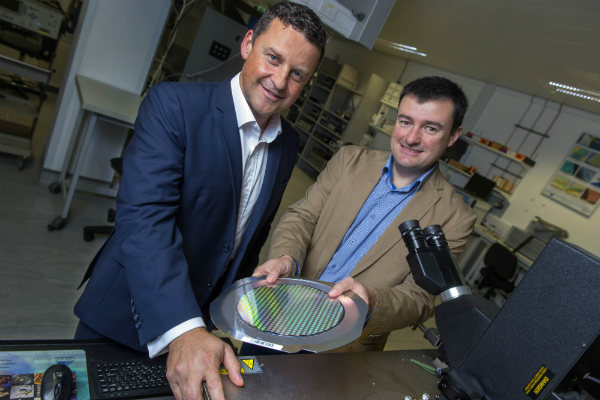
Microelectronic Circuits Centre Ireland collaborates with Boston Scientific to develop novel integrated circuits for next generation implantable medical devices
In collaboration with Boston Scientific, the Microelectronic Circuits Centre Ireland (MCCI) an EI/IDA funded Technology Centre hosted at Tyndall National Institute, has developed an innovative multi-function programmable electronic chip designed to enable heart pacemakers that can be smaller, more efficient and more convenient for patients.
The nano-watt power biomedical Integrated Circuit (IC) includes power management, a flexible microprocessor interface and therapy monitoring, that supports pacemaker and neuro-stimulation therapy applications. The prototype chip also incorporates a novel instrumentation amplifier to allow pacemaker devices to more effectively sense bio-potential signals.

"We have combined the pacemaker and other novel circuits into a single chip in order to make them smarter, more sensitive and more power-efficient, in addition to reducing form factor” explains Donnacha O’Riordan, MCCI Executive Director. “The programmable Integrated Circuit uses separate channels on a single chip for sensing the activity of the heart and for setting the pace of beating. This research will enable smaller implantable pacemakers in the future, which would result in less invasive procedures to implant them and the devices would need to be replaced less frequently, firmly establishing MCCI as a center of excellence for bio-medical microelectronics research.”
MCCI and Boston Scientific collaborated on the research program through a two-year Innovation Partnership supported by Enterprise Ireland and led by Gerry McGlinchey and Dr Ivan O’Connell at MCCI.
“The project has brought together the engineering and circuit-design expertise at MCCI and the medical and scientific expertise of researchers at Boston Scientific,” said Mr O’Riordan. “We look forward to building on this relationship in the next phase of our collaboration with Boston Scientific.”
Michael Keane, Process Development Director, Boston Scientific Clonmel, commented: “The relationship with MCCI has enabled a unique and accessible model of access to leading circuits design research, talented researchers and a flexible, business-like IP model. The bio-medical circuits research capability in MCCI is now a critical part of securing and growing Boston Scientific’s R&D presence in Ireland.”
About the multi-function Integrated Circuit:
Two Channels both Pace and Sense the heart activity and a novel Instrumentation Amplifier detects the low level bio signals. These heart signals are filtered, amplified and digitized by a differential 12 bit, 800sps SAR ADC. The Pace voltage level and duration is programmable.
A DC to DC Converter boosts the battery voltage, and quad-channel Neuro current outputs, generate programmable biphasic currents. The IC uses an internally generated real time clock.
A third channel provides for an Impedance Sensor Drive and Sense.
A digital Controller ensures the IC can continuously operate, while allowing the microprocessor to spend most of the time in a low power mode. The IC consumes 2700nA.
About MCCI:
Microelectronic Circuits Centre Ireland (MCCI) is hosted by the Tyndall National Institute in collaboration with the University of Limerick.
MCCI has core funding of €1M per annum from EI and IDA which is supplemented with co-funding from industry and other public sources.
MCCI is led by an industry steering board and the research program is driven by its industry members. Companies can use MCCI to create projects and execute world-beating industry-relevant research in line with their business needs.
About Tyndall National Institute:
Tyndall National Institute is a European leading research centre in integrated ICT (Information and Communications Technology) hardware and systems. Specialising in both electronics and photonics – materials, devices, circuits and systems – Tyndall works with industry and academia to transform research into products in its core market areas of electronics, communications, energy, health, agri-food & the environment. With a network of over 200 industry partners and customers worldwide, we are focused on delivering real impact from our excellent research. Tyndall at University College Cork, Ireland, employs over 460 researchers, engineers and support staff, with a full-time graduate cohort of 125 students. The institute generates over 230 peer-reviewed publications each year. We are experts at designing, miniaturising and prototyping products that are driving connectivity in the application of the industrial internet. Tyndall is the lead institution for the Science Foundation Ireland funded Irish Photonics Integration Centre (IPIC).
